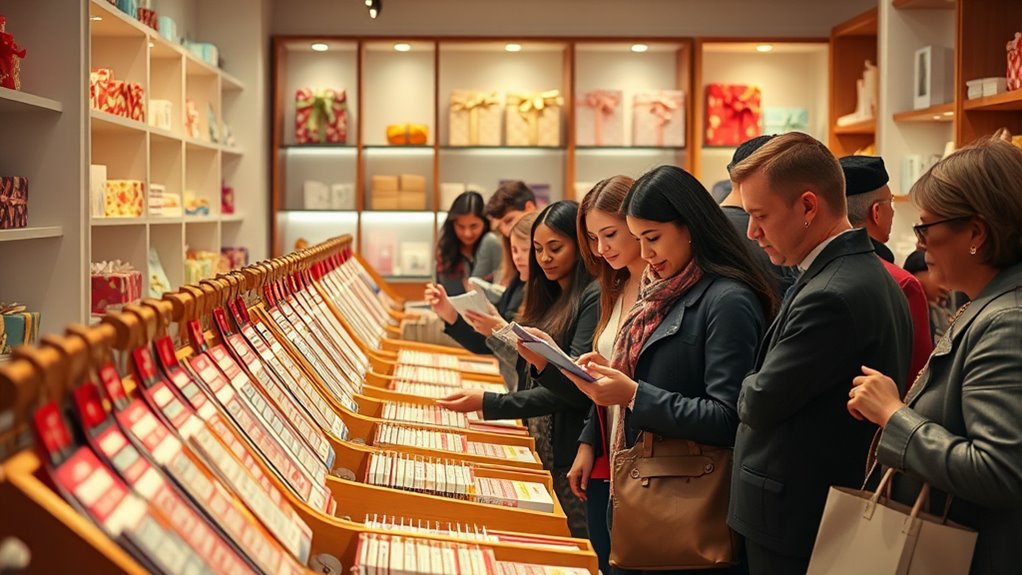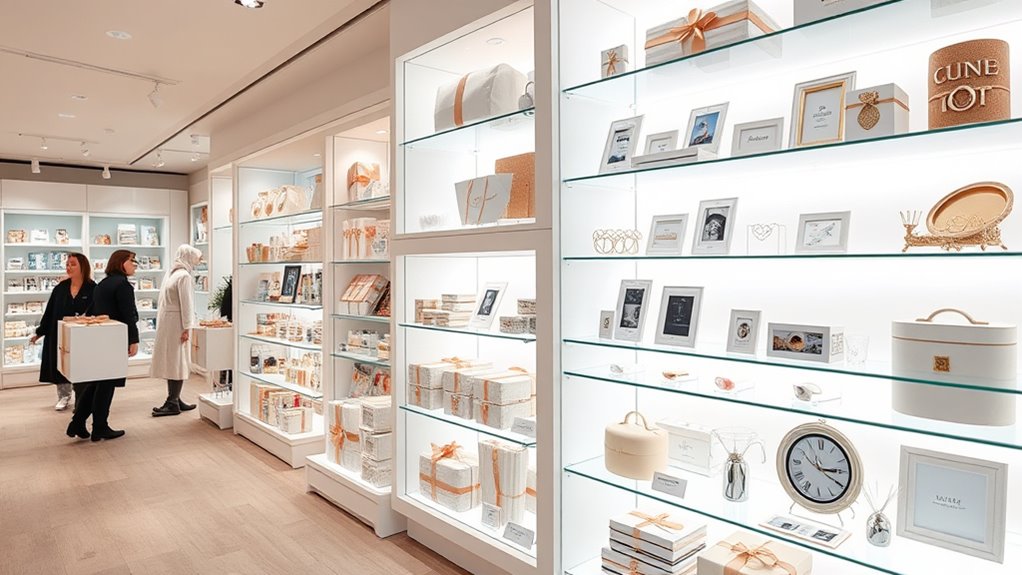Gift registries guide your shopping choices by highlighting preferred items, reducing decision stress, and reinforcing social norms of generosity. They shape perceptions of what’s appropriate or desirable, influencing both your preferences and how others give gifts. Cultural customs and evolving trends add layers to how registries impact behavior, encouraging eco-friendly, personalized, or tradition-based gifts. If you continue exploring, you’ll discover how these practices influence not just individual decisions but societal expectations around giving.
Key Takeaways
- Gift registries guide consumers toward recipient-preferred items, reducing uncertainty and encouraging socially appropriate choices.
- They reinforce social norms by establishing standards for thoughtful and acceptable gift-giving behaviors.
- Digital registries streamline decision-making, influencing perceptions of desirability and fostering a sense of social conformity.
- Gift registries shape consumer preferences through curated options, aligning shopping behaviors with cultural and social expectations.
- They promote generosity and normalize certain giving practices, affecting social norms around gift-giving etiquette.
The Evolution of Gift-Giving Traditions

Have gift-giving traditions really changed over time? Throughout history, cultural traditions shaped how people exchange gifts, with roots stretching back to ancient civilizations. In many societies, gift-giving signified respect, gratitude, or social bonds, often tied to religious or seasonal events. Over centuries, these practices evolved, influenced by trade, conquest, and cultural exchange. For example, the Victorian era emphasized elaborate presents and formal etiquette, while modern customs lean toward personalized and practical gifts. Technological advances and globalization have further transformed traditions, making gift-giving more accessible and diverse. Despite these changes, the core intent remains the same: strengthening relationships and expressing appreciation. The influence of cultural heritage plays a significant role in shaping gift-giving customs across different societies, helping explain why certain practices persist and how they adapt over time. Moreover, changing social norms have led to a greater emphasis on ethical sourcing and environmentally friendly gifts, reflecting a shift in societal values. Additionally, the integration of new design thinking approaches has encouraged more innovative and empathetic ways to connect through gifts, reflecting evolving social norms. Modern gift-giving is increasingly influenced by consumer behavior trends, which continue to shape how and why people choose particular presents. Recognizing how cultural adaptation influences gift-giving can provide deeper insights into these evolving traditions. Understanding the historical origins of gift-giving helps explain why certain customs persist and how they adapt over time.
How Registries Shape Consumer Decision-Making

Gift registries considerably influence consumer decision-making by guiding you toward specific items, often aligned with the recipient’s preferences. They tap into consumer psychology by reducing the uncertainty and stress of choosing the perfect gift. Instead of relying solely on personal judgment, you often use decision heuristics, such as selecting popular or recommended items, to simplify your choices. Registries create a curated shopping experience, which can lead you to prioritize items listed, sometimes overlooking other options. This process influences your perception of what’s appropriate or desirable, shaping your buying patterns. By providing clear cues about what the recipient wants, registries streamline your decision-making, making the process quicker and more confident. Additionally, curated shopping experiences can influence perceptions of product desirability and perceived value, further shaping consumer behavior. The presence of a guided framework in gift registries helps reinforce social norms about gift-giving and what is considered appropriate, thus shaping your consumer behavior by framing your choices within a guided framework. Moreover, understanding how decision heuristics operate can enhance the effectiveness of these registries in influencing consumer choices. Incorporating space and organization principles in the design of registries can further improve usability and decision efficiency, ultimately affecting shopping behaviors.
Furthermore, integrating energy efficiency ratings into the presentation of options can subtly influence your preferences toward more sustainable choices.
The Psychological Impact of Gift Preferences

Your gift preferences often reflect your sense of identity, making choices feel more personal. At the same time, you might feel anxious about picking the perfect item or pleasing others. Social approval can influence your decisions, sometimes overriding your true preferences. Additionally, understanding popular trends, such as best anime movies, can subtly shape your gift choices to align with current preferences. Recognizing how social engineering tactics can manipulate perceptions helps explain why individuals may conform to trends even when they differ from their authentic tastes. Being aware of how home decor influences perceptions can also affect how you present your personal style within social settings. Moreover, knowledge about vetted product recommendations can guide more authentic decision-making, reducing susceptibility to external influences. Awareness of cultural influences on gift choices further emphasizes the importance of personal authenticity in social interactions.
Personalization and Identity
Personalization in gift preferences reveals how individuals use their choices to express their identity. When you select gifts, you’re not just choosing objects—you’re engaging in personal branding and identity affirmation. Your preferences reflect who you are and what you value, shaping how others see you. Market demand influences the value of coins vs bars. Gift registries reinforce this by highlighting your unique tastes, making your identity visible to friends and family. Additionally, these preferences can influence emotional well-being, as they foster a sense of authenticity and self-awareness. The way electric bikes are priced and perceived also demonstrates how brand reputation can impact personal identity and social signaling. Recognizing the importance of self-expression in these choices highlights how consumer behavior often aligns with cultural and social norms. Moreover, understanding how air purifier maintenance and filter replacement routines reflect personal priorities emphasizes the role of self-presentation through health-conscious choices.
Anxiety Over Choices
Have you ever felt overwhelmed by the pressure to choose the perfect gift, only to second-guess your decision afterward? Gift registries can intensify this experience, leading to decision fatigue. When faced with numerous options, you might find yourself mentally exhausted, making it harder to select thoughtfully. This overload can trigger gift anxiety, where fear of giving the wrong item clouds your judgment. You may worry about whether your gift will be appreciated or if it aligns with the recipient’s preferences. As a result, your confidence diminishes, and choosing becomes stressful rather than enjoyable. Additionally, the presence of water-themed options in gift registries may influence preferences and expectations, adding another layer of complexity. This cycle of doubt and fatigue can diminish the pleasure of giving, turning what should be a joyful act into a source of worry. Recognizing these decision-making challenges can help you develop strategies to enjoy gift-giving more fully, especially when considering how decorative styles like farmhouse or rustic themes can influence perceptions of appropriateness and value.
Social Approval Effects
Gift preferences are often shaped by a desire for social approval, influencing how you select and give presents. You might choose items that reflect popular trends or celebrity influence to gain admiration. Peer validation plays a huge role in this process, as you want your gift choices to be appreciated by others. When your selections align with social expectations, you feel more confident and accepted.
- You seek out celebrity-endorsed products to impress others
- Peer validation encourages you to pick trendy or fashionable gifts
- Social norms push you toward popular gift choices
- The desire for approval influences your overall gift-giving behavior
These factors reinforce your motivation to conform, making social approval a key driver in your gift preferences.
Influence on Retail and E-Commerce Strategies

You can see how personalized gift recommendations shape your shopping experiences, making it easier to find the perfect item quickly. Retailers and e-commerce platforms are focused on streamlining purchase processes to reduce friction and increase conversions. By understanding gift registry behaviors, they adapt their strategies to better meet your needs and preferences.
Personalized Gift Recommendations
Personalized gift recommendations are transforming how retailers and e-commerce platforms engage with customers by offering tailored suggestions based on individual preferences and shopping behavior. These insights help you discover gifts that resonate culturally, respecting symbolism and gift etiquette. Retailers analyze your browsing and purchase history to suggest items aligned with your taste and social norms, making gift-giving more meaningful. This approach strengthens customer loyalty and boosts sales by creating a more personalized shopping experience.
- Leverages data to match cultural symbolism with gift choices
- Reinforces gift etiquette by suggesting appropriate presents
- Enhances customer engagement through tailored recommendations
- Drives e-commerce sales with precise, relevant options
Streamlined Purchase Processes
Streamlined purchase processes have become a key strategy for retailers and e-commerce platforms aiming to enhance customer satisfaction and boost sales. When you simplify checkout steps and reduce friction, you create a seamless experience that encourages quick decisions. Luxury branding benefits from minimalist design, which emphasizes elegance and clarity, making it easier for you to navigate high-end products effortlessly. By integrating clear visuals and intuitive interfaces, retailers make the buying process feel exclusive yet accessible. This approach not only increases conversions but also aligns with modern preferences for simplicity and sophistication. As a result, your shopping journey becomes more enjoyable, encouraging repeat visits and fostering a sense of trust in the brand. In today’s competitive market, streamlined processes are essential for success.
Shaping Social Expectations Around Generosity

Gift registries have become powerful tools for shaping social expectations around generosity by establishing clear norms for giving. They influence how people perceive appropriate gift-giving behaviors and reinforce cultural expectations. By providing a curated list, registries subtly set standards for what is considered thoughtful and generous.
Gift registries shape social norms and perceptions of generosity through curated gift standards.
- They create a shared understanding of what’s appropriate within social norms
- Encourage guests to give within established cultural expectations
- Reduce uncertainty about what to buy, aligning behavior with social standards
- Reinforce generosity by highlighting preferred and valued gifts
This process shapes collective perceptions of generosity, guiding behaviors in a way that maintains social cohesion and cultural traditions. Ultimately, gift registries help normalize certain giving practices, influencing how generosity is expressed and understood.
The Role of Personalization in Modern Registries

Personalization makes gift registries more engaging by offering options that truly match your preferences. When options are tailored to your style and needs, you’re more likely to find items you’ll love. Ultimately, customized choices guide your decisions and improve your shopping experience.
Customization Enhances Experience
When you customize a registry, it transforms the shopping experience into something more meaningful and engaging. Personalization allows you to reflect cultural symbolism and respect gift giving rituals, making each item more significant. You can select products that resonate with your values or cultural traditions, strengthening emotional connections. This tailored approach also helps your guests find gifts that genuinely suit your style and needs, reducing guesswork. By customizing, you create a memorable experience that highlights your personality and cultural identity.
- Incorporate meaningful symbols or traditions into your choices
- Curate items that align with your lifestyle and values
- Make gift giving more purposeful and thoughtful
- Foster a deeper sense of connection through personalized selections
Tailored Options Drive Choices
By customizing a registry, you empower guests to select items that truly reflect your preferences and needs. Personalization plays a key role in guiding choices, as cultural influences often shape what feels meaningful or appropriate. When your registry offers tailored options, it fosters a stronger emotional attachment to the items, making gift-giving more thoughtful and intentional. Guests are more likely to choose something that aligns with your style or values, enhancing their connection to the gift. This targeted approach not only simplifies decision-making but also ensures that the gifts you receive are more meaningful and useful. Ultimately, personalized registries help create a more fulfilling gift exchange, rooted in understanding your unique cultural context and emotional desires.
Addressing Fairness and Equality in Gift Giving

Ensuring fairness and equality in gift giving is essential to fostering positive relationships and reducing feelings of resentment or obligation. To address fairness concerns, you can support equality initiatives that promote considerate giving.
- Encourage open communication about gift expectations and budgets.
- Promote diverse gift options to accommodate different preferences and financial situations.
- Implement guidelines within registries to prevent overshopping or duplicate gifts.
- Recognize that equitable giving isn’t about equal value but thoughtful intent and inclusivity.
Cultural Variations in Registry Practices

Cultural differences considerably influence how gift registries are created and used across the globe. In some regions, cross-cultural rituals shape how people approach gift giving, emphasizing communal values or personal relationships. For example, in certain Asian cultures, regional customs prioritize modesty and harmony, leading to more discreet registry practices. Conversely, Western traditions often encourage open sharing of registry lists, reflecting individual preferences. In Latin American countries, gift exchanges may involve elaborate ceremonies, affecting how registries are integrated into celebrations. These cultural variations determine not only what items are listed but also how openly they’re shared and perceived. Understanding these regional customs helps you appreciate the diverse ways societies approach gift registries, highlighting their role in reinforcing social norms and cultural identities worldwide.
The Future of Gift Registries and Shopping Trends

As technology continues to evolve, so do the ways you approach gift registries and shopping habits. Future trends will likely blend intergenerational traditions with modern convenience. You might see more platforms emphasizing eco-friendly options, allowing you to choose sustainable gifts that align with your values. Personalized digital registries will become more common, making it easier to cater to different generations’ preferences. Virtual reality could transform how you browse and select items, creating immersive shopping experiences. Additionally, social sharing features will encourage communal participation in gift-giving, strengthening bonds across age groups.
- Emphasis on eco friendly options for sustainable gifting
- Digital platforms supporting intergenerational traditions
- Virtual reality and immersive shopping experiences
- Social sharing enhancing communal gift-giving
Ethical Considerations and Consumer Autonomy

When choosing gift registries and shopping options, you have the power to make ethical decisions that align with your values, but these choices also come with complex considerations. Privacy concerns, such as data sharing and tracking, can compromise your autonomy if not transparently addressed. Ensuring informed consent is crucial; you should know how your information is used and have control over it. To evaluate options, consider this table:
| Aspect | Consideration |
|---|---|
| Privacy Concerns | How your data is collected, stored, and shared |
| Informed Consent | Clarity about data use and user rights |
| Ethical Practices | Commitment to fair labor and sustainable sourcing |
| Autonomy | Ability to choose without undue influence or pressure |
| Transparency | Clear communication from providers about policies |
Being aware of these factors helps you make more autonomous, ethical choices.
Frequently Asked Questions
How Do Gift Registries Affect Non-Participating Guests’ Gift Choices?
When you’re a non-participating guest, gift registries often limit your choices, making it harder to find alternative options that feel personal. You might feel pressured to pick from the list, reducing your spontaneity. However, some guests choose to bring thoughtful, non-registry gifts, embracing spontaneity and offering unique alternatives. Ultimately, registries shape your gift-giving by guiding choices, but you can still find ways to add personal touches beyond the list.
What Are the Privacy Concerns Associated With Registry Data Collection?
When it comes to registry data collection, you should be aware of privacy concerns that could impact your personal privacy. Retailers and platforms collect data security information, including your shopping preferences and personal details, which may be vulnerable to breaches. This data might be shared or used without your explicit consent, raising concerns about how your personal privacy is protected. Always review privacy policies and opt for secure, trusted registry services to safeguard your information.
How Do Registries Influence Gift-Giving Behaviors Across Different Age Groups?
You might be surprised to learn that 65% of people say gift registries shape their giving choices. Registries influence gift-giving behaviors by aligning with age-specific preferences and generational expectations. Younger generations often prefer experiential or personalized gifts, while older ones lean toward traditional items. This creates a dynamic where gift givers consider the recipient’s age and expectations, making the process more tailored and socially acceptable across different age groups.
Can Gift Registries Perpetuate Social Inequalities?
You might wonder if gift registries perpetuate social inequalities. They can, because wealth gaps and socioeconomic factors influence who can afford to buy certain gifts, making some people feel pressured to conform to specific expectations. This dynamic can reinforce existing disparities, as those with fewer resources may struggle to meet social norms or feel excluded from certain gifting practices, ultimately widening the gap between different social or economic groups.
How Might Emerging Technologies Revolutionize Future Gift Registry Practices?
Imagine using virtual reality to tour a dream home registry or AI personalization to suggest perfect gifts based on your preferences. Emerging technologies like VR and AI could revolutionize future gift registry practices by making them more immersive and tailored. You might browse a virtual store or receive personalized recommendations instantly, enhancing your shopping experience. These innovations will make gift registries more engaging, efficient, and reflective of individual tastes.
Conclusion
Just like a well-tended garden, gift registries nurture social bonds and guide your choices, shaping traditions and expectations. Imagine walking into a store with a map, knowing exactly what’s needed and appreciated—saving time and avoiding awkwardness. As trends evolve and cultural norms shift, your awareness of these influences helps you gift thoughtfully and responsibly. Embrace this evolving landscape, knowing your choices can blossom into meaningful connections that last.









